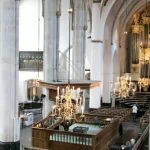Welcome
Welcome to the Sint Joriskerk (St. George's Church) in Amersfoort
… …also if you can’t follow the services in Dutch!
Every Sunday the services are translated into English, which enables foreign guests to understand what is said and done, and to join in worship. Upon entering the church, you can report to one of the hosts, who will then give you a headset with a receiver for ‘live’ translation, as well as a printed English order of service.
Services begin, every Sunday, at 9:30 a.m. and 6:00 p.m. Once again, Welcome!
Liturgy
Liturgy of the service on Sunday
Organ playing
Before the service itself begins, the organ is played. People enter the church, have a chat with each other, and take a seat. There are no reserved seats. Small children are taken to the child care room.
Entrance of the church council
After the organ playing has stopped (9:30 AM or 6 PM sharp), the church council (the council elected by the church members) enters the church. The man in the gown is the minister, who leads the service. One of the church council members welcomes all (including all who ‘attend’ the service via the internet), sometimes makes a couple of announcements, and announces the opening psalm/hymn to be sung.
Singing before the service
The congregation sings the specified song. All songs are sung “rhythmically”, as indicated in the music notation of the songs in the books. One of the church council members leads the minister to the pulpit and they shake hands. In so doing the church council authorizes the minister to lead the service on its behalf.
Silent Prayer
Everyone, also the minister at the bottom of the stairs of the pulpit, is given the opportunity to pray in silence, asking that God will bless the service.
Votum and Salutation
This is the “actual” beginning of the service. In the Votum (“Our help”) the congregation (through the minister) expresses its dependence on God. In the Salutation, also proclaimed by the minister, the congregation is greeted by God, its Helper.
Singing
Following the Votum and Salutation, the congregation sings a psalm or hymn, often one in which God is praised.
Reading of God’s Law or the Creed
In the morning services the minister reads the law of God (usually the Ten Commandments, together with Jesus’ summary of them), as a rule to live by in the presence of God: loving God above all, and our neighbour as ourselves. In the evening services the minister reads one of the old creeds, usually the Apostles’ Creed. By doing so (in silence, in the heart), the congregation confesses the faith it shares with that of Christians of “all times and places”.
Singing
In response to the Commandments or Confession of faith, the congregation sings a fitting psalm or hymn.
Prayer
Before reading from the Bible, the minister prays that the Holy Spirit will apply the preached Word (the sermon) to hearts and lives of the listeners. The prayer concludes with “amen”, Hebrew for “so it is certain”.
Reading of the Bible
The minister reads one (or more) passage(s) in the Bible, and indicates which part will be central in the sermon. The Bible is the principal means of grace and the unfailing foundation of preaching.
Offering
Before the minister starts the sermon, he announces for which (2 or 3) purposes in this service the offerings are collected. These are our gifts to the Lord to show thankfulness to God for His abundant gifts to us. Offerings can be for our own church, for the diaconate (charity, within or outside the church), or for other specific purposes (actions, organizations, etc.). The offerings are collected in collection bags, in which money can be put. There is no obligation to put a gift in the collection bags. During the offering the organ is played, and young children go to Bible class.
Singing
Once the offerings have been collected, the organ playing switches to an accompaniment of the congregational singing. The psalms or hymns to be sung are intended to prepare hearts for the reception of the Word of God.
Preaching the sermon
Biblical preaching is central to worship and it is God’s primary means of speaking to us and saving us by His grace. In the sermon, which lasts about 30 minutes, the minister explains the meaning of the passage(s) in the Bible he has chosen, and how it touches the lives of the members of the congregation. Expressed in words from the Bible itself: “All Scripture is inspired by God and is useful for teaching, refuting, correcting and educating in righteousness, so that man who belongs to God may be perfect, fully equipped for every good work”.
Usually the sermon is about one or more passages in the Bible, but sometimes the sermon is “topical”, addressing a particular theme relevant to the congregation. A service is then called a “doctrinal service” because of the focus on systematic teaching, often from one of the confessions of faith that have been adopted by the church (a confession of faith, for example the Heidelberg Catechism, is a document in which the church has summarized key teachings of the Christian faith).
Singing
In response to the preaching of the Word, the congregation sings a fitting psalm or hymn.
Congregational prayer
The service is nearing its end, and the minister prays to God on behalf of the congregation for a variety of pastoral and public needs. He thanks God that it was possible to preach the Word, he prays that God will bless it, that it will renew the lives of the hearers, and will bring them (closer to) God. The minister also thanks God for joyful events in the congregation, and prays for the needs of the sick and afflicted, for emerging church activities, for governments, for fruitful dissemination of the Gospel (the “good message” of God), for healing of suffering in the world, and so on. Again, the prayer is concluded with “amen”, because we trust that God has heard the prayer.
Singing
After the children from the Bible class have returned to the church, the congregation sings a final psalm or hymn. This “final song” is sung while standing.
Benediction
The congregation receives, through the minister, God’s blessing. This blessing is God’s promise that He wants to be with us with His grace. In that way the congregation does not leave God behind in the church.
The church council returns to the consistory room
After the Benediction the minister leaves the pulpit, and the minister and a church council member shake hands again. With this handshake the church council accepts responsibility for the service from the minister.
Organ playing
As the organ starts playing, the members of the congregation exit the church or, on some occasions, after first having a cup of coffee (the opportunity to do so will have been announced).
Scroll read more…
A few times in the year, special services with the sacraments are held. A brief explanation is given of these.
Baptismal services
In baptismal services children born to church members are baptized, usually when they are a few weeks old. Baptism does not only mean that the child is now a member of the church, but also that the child now carries God’s well-meant promise that He wants to be its personal God.
In the service the minister reads a form explaining in detail what baptism is all about. After reading the form, the infant is carried in to the church, and is baptized by the minister, who sprinkles water on its forehead in the name of God the Father, the Son, and the Holy Spirit.
Celebration of the Holy Supper
Four times per year the Holy Supper is administered and celebrated. It is a very simple “meal”, to which all confessing members of a Christian church are invited. Each participant takes and eats a piece of bread (signifying Jesus’ broken body) and drinks a sip of wine from a special cup, called a chalice (signifying Jesus shedding His blood for the remission of sins). Jesus explicitly told the churches to do so: “Do this in remembrance of Me” (Luke 22:19). Before the celebration the minister reads a form in which the essence of the Holy Supper is explained in detail.
Some features of our worship
- Bible: This book is the basis of the Christian faith. We believe that God speaks to us through the Bible and that the sermon by the minister is one of the central elements in our worship service. You may use one of the Bibles found on the table near the entrance of the church. Some of these contain, next to the books of the Bible (Old Testament and New Testament), the Psalms we sing, the Creeds we adhere to and the forms used for the Sacraments. Sometimes these also found in separate publications.
- Consistory. The consistory or church council is responsible for the liturgy of the service. They are the elected male members of the congregation that carry out special tasks in our congregation. These tasks are called offices. The church council consists of a minister, elders, deacons and elder-custodians. More information can be gained from a booklet in the cupboard near the exit or by contacting us personally.
- Psalms. The Psalms we sing come from the Bible, have been put to rhyme and music. In our liturgy we use the classic version of 1773 and Weerklank of 2015.
GOD’S LAW AND THE CREED
Often these Old Testament words are supplemented with the summary as given by Jesus, e.g. in Mark 12:29-31,“The first of all the commandments is: ‘Hear, o Israel, the Lord our God, the Lord is one. And you shall love the Lord your God with all your heart, with all your soul, with all your mind, and with all your strength. This is the first commandment. And the second, like it, is this: ‘You shall love your neighbor as yourself. There is no other commandment greater than these.”
The Apostles’ Creed
This creed, dating back to the 4th century, is called the Apostles’ Creed not because it was produced by the apostles themselves but because it contains a brief summary of their teachings.
1 I believe in God, the Father, Almighty, Creator of heaven and earth.
2 And in Jesus Christ, his only begotten Son, our Lord,
3 who was conceived by the Holy Spirit, born of the virgin Mary.
4 He suffered under Pontius Pilate, was crucified, died, and was buried; he descended into hell.
5 The third day he rose again from the dead.
6 He ascended to heaven and is seated at the right hand of God the Father Almighty,
7 from there he will come to judge the living and the dead.
8 I believe in the Holy Spirit.
9 I believe in the holy universal Christian church, the fellowship of saints,
10 the forgiveness of sins,
11 the resurrection of the body,
12 and the life everlasting.
Amen.
God’s Law
Also called the “Ten Commandments”, God’s Law can be found in the Bible, in the book of Exodus 20: 1-17 (and in slightly different wording in Deuteronomy 5:6-21). The law is usually read in the morning services.
And God spoke all these words, saying: “I am the LORD your God, who brought you out of the land of Egypt, out of the house of bondage.
1 “You shall have no other gods before Me.
2 “You shall not make for yourself a carved image—any likeness of anything that is in heaven above, or that is in the earth beneath, or that is in the water under the earth;
you shall not bow down to them nor serve them. For I, the LORD your God, am a jealous God, visiting the iniquity of the fathers upon the children to the third and fourth generations of those who hate Me, but showing mercy to thousands, to those who love Me and keep My commandments.
3 “You shall not take the name of the LORD your God in vain, for the LORD will not hold him guiltless who takes His name in vain.
4 “Remember the Sabbath day, to keep it holy. Six days you shall labour and do all your work, but the seventh day is the Sabbath of the LORD your God. In it you shall do no work: you, nor your son, nor your daughter, nor your male servant, nor your female servant, nor your cattle, nor your stranger who is within your gates.
For in six days the LORD made the heavens and the earth, the sea, and all that is in them, and rested the seventh day. Therefore, the LORD blessed the Sabbath day and hallowed it.
5 “Honour your father and your mother, that your days may be long upon the land which the LORD your God is giving you.
6 “You shall not murder.
7 “You shall not commit adultery.
8 “You shall not steal.
9 “You shall not bear false witness against your neighbour.
10 “You shall not covet your neighbour’s house; you shall not covet your neighbour’s wife, nor his male servant, nor his female servant, nor his ox, nor his donkey, nor anything that is your neighbour’s.”


